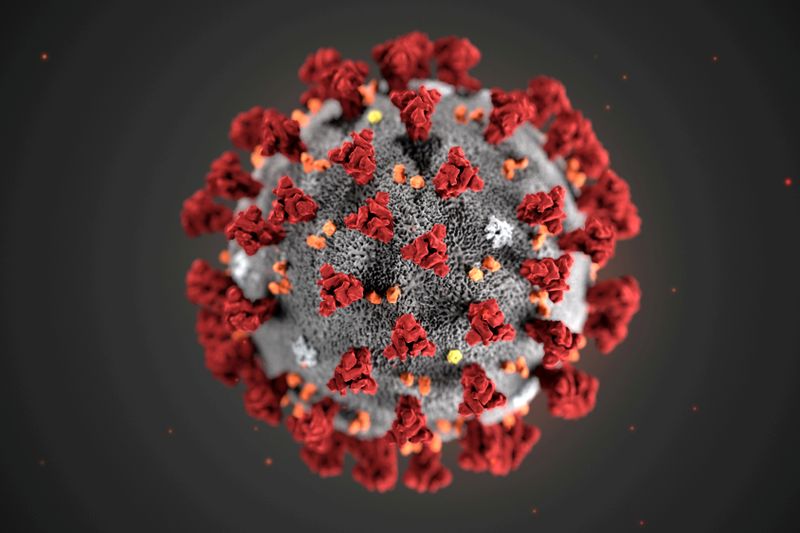By Nancy Lapid
(Reuters) - The following is a roundup of some of the latest scientific studies on the novel coronavirus and efforts to find treatments and vaccines for COVID-19, the illness caused by the virus.
Immune protection against severe reinfection appears lasting
Regardless of their detectable antibody levels, most COVID-19 survivors are likely to have lasting protection against severe COVID-19 if they become reinfected, thanks to other components of the body's immune response that remember the new coronavirus in different ways, researchers say. In a study of 185 patients, including 41 who had been infected more than six months earlier, scientists at La Jolla Institute for Immunology in California found that multiple branches of the immune system - not just antibodies - recognized the novel coronavirus for at least eight months. For example, so-called memory B cells that could recognize the virus and produce antibodies to fight it were more abundant six months after infection than at one month, they reported in a paper posted on Monday on bioRxiv ahead of peer review. The new findings "suggest that the immune system can remember the virus for years, and most people may be protected from severe COVID-19 for a substantial time," said study leaders Shane Crotty and Alessandro Sette. (https://
Final data from Pfizer vaccine trial shows 95% efficacy
Final results from Pfizer Inc (NYSE:PFE)'s pivotal COVID-19 vaccine trial show it had a 95% success rate - even higher than an earlier analysis - and two months of follow-up data without serious side effects, the company said on Wednesday. In the study involving about 43,000 volunteers, 162 of the 170 who contracted COVID-19 had received a placebo, not the vaccine. Of the 10 participants who had severe COVID-19, only one had received the vaccine. The final analysis of the trial's data comes a week after interim results showed the vaccine was more than 90% effective. Moderna (NASDAQ:MRNA) Inc on Monday released preliminary data for its vaccine, showing 94.5% effectiveness. Pfizer said the efficacy its two-dose vaccine, developed with German partner BioNTech SE (NASDAQ:BNTX), was consistent across different age and ethnic groups. Efficacy in adults over age 65 was over 94%. Pfizer said it expects to make up to 50 million vaccine doses this year - enough to inoculate 25 million people - and up to 1.3 billion doses in 2021.
Respiratory muscle damage linked to severe COVID-19
Critically ill COVID-19 patients develop virus-induced damage of respiratory muscles, scientists at Amsterdam UMC in The Netherlands reported on Monday in JAMA Internal Medicine. They performed autopsy studies of the diaphragm, the main respiratory muscle, in 26 COVID-19 patients who died in the intensive care unit (ICU) and 8 ICU patients who died without COVID-19. In everyone, the diaphragm muscle cell membranes contained a protein called ACE2, which the new coronavirus uses as an entryway into cells. The researchers found genetic evidence of the virus in diaphragm muscle cells in some of those who died from COVID-19, and microscopy analyses showed much more connective tissue scarring (fibrosis) in COVID-19 patients' diaphragms, indicating damage, study coauthor Coen Ottenheijm told Reuters. He said the diaphragm damage may help explain why it is often difficult for COVID-19 patients to breathe on their own again after they have been on mechanical ventilators in the ICU. It may also explain the persistent shortness of breath in patients recovering from COVID-19. (https://
Cardiac arrest survival is down during the pandemic
U.S. data from early this year suggest the pandemic has led to decreased survival rates after "out-of-hospital" cardiac arrest. Based on nationwide data, the proportion of patients whose hearts could be restarted was 21% lower in March-April 2020 than in the same period in 2019, researchers reported on Saturday at the annual American Heart Association meeting, held virtually this year, and in JAMA Cardiology. The proportion of patients who survived to be discharged from hospitals was also lower in 2020, at 6.6%, versus 9.8% in 2019. Survival rates after out-of-hospital cardiac arrest had nearly doubled in the last 20 years, and "we want to make sure we don't lose those gains," said coauthor Dr. Paul Chan of St. Luke's Mid-America Heart Institute in Missouri. Dr. Clifton Callaway of the University of Pittsburgh, who viewed the presentation but was not involved in the study, said other viewers noted it is more difficult for paramedics to work wearing full personal protective gear as it takes time to put on and can impede emergency care. Furthermore, some patients may have delayed calling for help over concerns of becoming infected with the coronavirus. And some may have also had COVID-19, making their medical condition more severe. (https://

Open https://tmsnrt.rs/3a5EyDh in an external browser for a Reuters graphic on vaccines and treatments in development.